|
|
2008/2009 ARMADA Master Teachers
- Roy Arezzo- New York Harbor School, Brooklyn, NY
- Tom Bogard- Olentangy Orange Middle School, Lewis Center, OH
- Maria Gomez- Dr. T Alexander Science Center, Los Angeles, CA
- Stephen Howard- Meadowdale Middle School, Lynnwood, WA
- John Karavias- Walt Whitman High School, Huntington Station, NY
- Jeff Lawrence- Lowery Public School CO10, Tahlequah, OK
- Cheryl Manning- Evergreen High School, Evergreen, CO
- Zamaria Rocio- Horace Mann Middle School, San Diego, CA
- Karen Rudio- Calcutt Middle School, Central Falls, RI
- Nancy Sills- Harris County Carver Middle School, Hamilton, GA
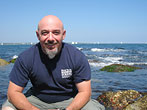 Greetings, I'm Roy Arezzo, a native of Brooklyn, and I have been teaching science in New York City since 1989. I have served as a science department leader and curriculum developer in a variety of secondary education settings. I have a B.S. in biology from Marist College, on the Hudson River, and a Master's in Environmental Science Education. I have developed and taught courses in biology, environmental science, research and marine science. Greetings, I'm Roy Arezzo, a native of Brooklyn, and I have been teaching science in New York City since 1989. I have served as a science department leader and curriculum developer in a variety of secondary education settings. I have a B.S. in biology from Marist College, on the Hudson River, and a Master's in Environmental Science Education. I have developed and taught courses in biology, environmental science, research and marine science.
I am the founding science teacher at New York Harbor School (NYHS) in Bushwick, Brooklyn, a small, public theme-based Urban Assembly School that opened in fall of 2003. Despite being landlocked, NYHS is committed to connecting students to their local water resources. My class, Introduction to New York Harbor, is an interdisciplinary field class that has an in-house component for lab and class work. We take students on and near the water around the NY/NJ estuary system to learn about local ecology, marine science, water quality, human impact and history.
I am currently involved in several community projects related to estuary science, small boat handling, composting, local food systems, community gardens and bicycle advocacy. I seek out research opportunities during my summers and have volunteered as a field tech on several projects in Costa Rica, Guatemala and Alaska. I have served on the Advisory Board of the Columbia University Summer Research Program for Science Teachers since I participated in the program in 1996- where I spent two summers studying the molecular biology of parasitic worms in an environmental health science lab. I am especially excited for my ARMADA placement and the chance to work with researchers doing work in-line with the theme of our school. When I am not in the field, on the water or on my bike, I like to see live music or escape the city for the forest.
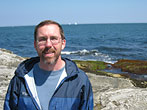 My name is Tom Bogard. I have had the pleasure of teaching middle school science for the past 15 years at Olentangy Local Schools in central Ohio. Education is a second career for me - it is a career that I have found a true passion for. Prior to becoming a teacher, I was coordinator of a small prairie nature center at The Ohio State University and I spent eight years in the Ohio Air National Guard. My name is Tom Bogard. I have had the pleasure of teaching middle school science for the past 15 years at Olentangy Local Schools in central Ohio. Education is a second career for me - it is a career that I have found a true passion for. Prior to becoming a teacher, I was coordinator of a small prairie nature center at The Ohio State University and I spent eight years in the Ohio Air National Guard.
My previous ocean and shipboard experience includes participating in NOAA's Teacher at Sea program aboard the NOAA Ship Fairweather in the Shumagin Islands, Alaska mapping the sea floor. I also participated in a research experience on the EPA's R/V Lake Guardian on Lake Erie. I have attended other quality science programs and enjoy bringing all of my experiences into my classroom and sharing them with other teachers. I now look forward to bringing my ARMADA experiences back to my classroom. I hope that my ARMADA experience will help me to pass on my sense of wonder, adventure, and desire to learn about our amazing world to my students.
When not engaged in teaching, I enjoy camping, fishing, and kayaking with my family and being in the outdoors. In addition, I enjoy reading, photography and flying gliders.
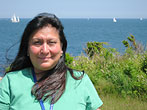 My name is Maria D. Gomez and I teach 4th Grade at the Dr. T. Alexander Science Center School in Los Angeles. I have been teaching for 30 years, the majority of that time in California and in Michigan. Our school is an affiliated charter school, which means we are sponsored by the California Science Museum and the Los Angeles Unified School District. As such, our focus is on science, math, and technology in the classroom. Students who attend our school all aspire to become scientists when they grow up. My students are so excited about me being a "real scientist" and working with other scientists as part of the ARMADA Project. I am eager to begin my role as a "scientist" at the field site and then return to my students in the fall to share all of my experiences. My name is Maria D. Gomez and I teach 4th Grade at the Dr. T. Alexander Science Center School in Los Angeles. I have been teaching for 30 years, the majority of that time in California and in Michigan. Our school is an affiliated charter school, which means we are sponsored by the California Science Museum and the Los Angeles Unified School District. As such, our focus is on science, math, and technology in the classroom. Students who attend our school all aspire to become scientists when they grow up. My students are so excited about me being a "real scientist" and working with other scientists as part of the ARMADA Project. I am eager to begin my role as a "scientist" at the field site and then return to my students in the fall to share all of my experiences.
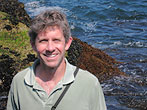 My name is Stephen Howard and I currently teach 7th and 8th grade general science at Meadowdale Middle School in Lynnwood, Washington (about 15 miles north of Seattle). Though I cover many areas of earth, space, physical and life science in my teaching, areas of particular interest to me are environmental sustainability, climate change, and marine biology. One highlight of each year is to take a group of my students on a 4-day sailing excursion around the Puget Sound studying plankton and factors that influence their abundance. This is my 14th year as a teacher. Though I was raised in the San Diego area, teaching brought me up to the Pacific Northwest where I've lived ever since (with the exception of an exciting year overseas teaching in Guam-I got to experience a Level 5 Typhoon that year!). I've never lived more than an hour's drive from the ocean and feel more at home on the beach than anywhere else. When I'm not teaching, I like to spend my time cooking, reading, sea kayaking, hiking and generally horsing-around with my 6-year old daughter. My name is Stephen Howard and I currently teach 7th and 8th grade general science at Meadowdale Middle School in Lynnwood, Washington (about 15 miles north of Seattle). Though I cover many areas of earth, space, physical and life science in my teaching, areas of particular interest to me are environmental sustainability, climate change, and marine biology. One highlight of each year is to take a group of my students on a 4-day sailing excursion around the Puget Sound studying plankton and factors that influence their abundance. This is my 14th year as a teacher. Though I was raised in the San Diego area, teaching brought me up to the Pacific Northwest where I've lived ever since (with the exception of an exciting year overseas teaching in Guam-I got to experience a Level 5 Typhoon that year!). I've never lived more than an hour's drive from the ocean and feel more at home on the beach than anywhere else. When I'm not teaching, I like to spend my time cooking, reading, sea kayaking, hiking and generally horsing-around with my 6-year old daughter.
I am fortunate to be going on an expedition above the Arctic Circle to help map the sea-floor. Though I did live for one year in Juneau, Alaska, I've never been farther north than Anchorage and I'm very excited to experience arctic ice and the critters that call that region "home." I look forward to spending many hours snapping pictures and conjuring up ways to share this adventure with my students and colleagues back home. I am grateful to the ARMADA project for providing me with this once-in-a-lifetime opportunity.
 I'm John Karavias from Holbrook, New York and I teach college-level marine biology at Walt Whitman High School in Huntington Station, New York. My journey from biology teacher to ARMADA master teacher started 5 years ago when I was awarded an $8,000 grant by the South Huntington Education Foundation (SHEF) to build a saltwater laboratory in my classroom. From being a "dry" school a few years ago, to currently offering marine biology to over 100 students yearly is something of which Whitman is very proud. As a result of the SHEF grant and the support of my district, we have made tremendous strides! Furthermore, several of my students each year have moved on to study marine science in post-secondary academia. I'm John Karavias from Holbrook, New York and I teach college-level marine biology at Walt Whitman High School in Huntington Station, New York. My journey from biology teacher to ARMADA master teacher started 5 years ago when I was awarded an $8,000 grant by the South Huntington Education Foundation (SHEF) to build a saltwater laboratory in my classroom. From being a "dry" school a few years ago, to currently offering marine biology to over 100 students yearly is something of which Whitman is very proud. As a result of the SHEF grant and the support of my district, we have made tremendous strides! Furthermore, several of my students each year have moved on to study marine science in post-secondary academia.
I have been teaching high school biology and marine biology at Whitman for the past nine years. Additionally, I teach science courses at the district's alternative high school in the evening. By day's end, I have had the privilege of educating students at almost every academic level - a truly unique and rewarding experience.
The support of my wife Dana will make this trip possible, for she will be tending to our wonderful boys Jacob and Troy. Our family enjoys "movie" nights every week and my children love hot rods (as their mom and I each have one). Jacob wants to be a "paleontologist" and presently Troy wants to be a "shark scientist."
I am tremendously looking forward to the upcoming experience. I plan to infuse into my teaching the research techniques and skills to which I will ultimately be exposed. In fact, I have always incorporated life experiences within my classroom lessons to generate a pure sense of student interest and relevancy. In sum, the days I spend with the ARMADA Project will be with me forever and are sure to enhance and enrich my marine biology curriculum.
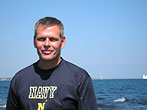 My name is Jeff Lawrence and I teach at Lowrey School, in Northeast Oklahoma near Tahlequah, which happens to be the tribal headquarters for the Cherokee Nation. I teach 5th through 8th grade science and have taught for 21 years at Lowrey. I also teach a college course on science at the local university. I enjoy traveling and about any sport or physical activity. I like to run and I coach team sports at my school. I have attended NOAA's Teacher at Sea Program and the Maury Project at the Annapolis Naval Academy last summer. I have always had a great interest in ocean studies, but have had little opportunity here in landlocked Oklahoma. I grew up watching Jacques Cousteau and dreaming of being an oceanographer. I love to teach science-it is always changing and presenting new ideas, topics, and discoveries to introduce to young curious minds. My name is Jeff Lawrence and I teach at Lowrey School, in Northeast Oklahoma near Tahlequah, which happens to be the tribal headquarters for the Cherokee Nation. I teach 5th through 8th grade science and have taught for 21 years at Lowrey. I also teach a college course on science at the local university. I enjoy traveling and about any sport or physical activity. I like to run and I coach team sports at my school. I have attended NOAA's Teacher at Sea Program and the Maury Project at the Annapolis Naval Academy last summer. I have always had a great interest in ocean studies, but have had little opportunity here in landlocked Oklahoma. I grew up watching Jacques Cousteau and dreaming of being an oceanographer. I love to teach science-it is always changing and presenting new ideas, topics, and discoveries to introduce to young curious minds.
I am very excited for the opportunity to participate in the ARMADA project and am sure that I will learn many interesting facts to bring back and share with my students, as well as excite them about the many wonders of the world's ocean system. I will also share my newfound knowledge with my college students, and hope to create a spark that will allow them to pursue the many wonders of the oceans, that they in turn can share with their future students. Oklahoma students learn a lot about the weather and geology, but have little opportunity to learn about the other two thirds of our planet's surface. I believe that I will have a lifelong learning experience that I am sure I will always treasure for the rest of my life.
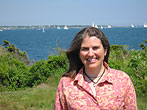 Hello my name is Cheryl Manning and I'm a teacher at Evergreen High School in Evergreen, Colorado. I teach 9th grade honors earth science and environmental science to 11th and 12th graders. I have lived my entire life landlocked. As a young person growing up on a ranch in Montana, I visited the Pacific once. As a college student in the Intermountain West, I had the opportunity to go to both the Pacific and Atlantic a few times. For my honeymoon, my husband and I visited the Caribbean. As a geologist and teacher there is nothing more important to me than to learn about the parts of our planet that that I'm not familiar with. In my visits to the ocean I have learned that I love the sea and I would love to share a new understanding of the ocean and ocean processes with my students. I look forward to this adventure and hope to develop a new appreciation for scientific research and the process of learning, and let these enliven and enrich my teaching. Hello my name is Cheryl Manning and I'm a teacher at Evergreen High School in Evergreen, Colorado. I teach 9th grade honors earth science and environmental science to 11th and 12th graders. I have lived my entire life landlocked. As a young person growing up on a ranch in Montana, I visited the Pacific once. As a college student in the Intermountain West, I had the opportunity to go to both the Pacific and Atlantic a few times. For my honeymoon, my husband and I visited the Caribbean. As a geologist and teacher there is nothing more important to me than to learn about the parts of our planet that that I'm not familiar with. In my visits to the ocean I have learned that I love the sea and I would love to share a new understanding of the ocean and ocean processes with my students. I look forward to this adventure and hope to develop a new appreciation for scientific research and the process of learning, and let these enliven and enrich my teaching.
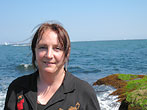 I'm Zamaria Rocio and for the past few years, I have had the privilege of teaching science to a diverse group of energetic middle school children from the inner city of San Diego. There are over 20 different primary languages spoken at our school. I feel very fortunate teaching these multicultural students because I am also learning so much from them. I'm Zamaria Rocio and for the past few years, I have had the privilege of teaching science to a diverse group of energetic middle school children from the inner city of San Diego. There are over 20 different primary languages spoken at our school. I feel very fortunate teaching these multicultural students because I am also learning so much from them.
However, when I return to school and ask the infamous question, "what did you do on your summer vacation?" I want to be the first person to talk. I will have had a unique opportunity to see a different part of the world- Australia. I am excited to go there since I have never been to the southern hemisphere. The ARMADA Project will take me to the gorgeous corals reefs off Heron Island to work with scientists Laetitia Plaisance and Nancy Knowlton. I will be helping them collect amazing marine life from the corals for their census. It was because of my desire to learn new things, get out of my comfort zone, and the eagerness to share with others that prompted me to apply to this program.
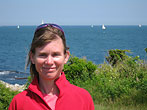 Hi! I'm Karen Rudio. I have been teaching 7th and 8th grade science at Calcutt Middle School in Central Falls, Rhode Island for the past seven years. I enjoy working with the urban youth and sharing my enthusiasm for science with them. The ARMADA Project will spark their imaginations and make science real for them. I am very excited about this opportunity to join a research expedition. Prior to teaching, I was a research assistant doing tissue culture. I have a Master's in Biological Oceanography from the University of Rhode Island. I have also worked as a Peace Corps volunteer assisting fishpond owners in the Philippines. Besides teaching, I enjoy being a karate Mom, doing volunteer work, traveling and being outdoors---hiking, camping and bird watching. Hi! I'm Karen Rudio. I have been teaching 7th and 8th grade science at Calcutt Middle School in Central Falls, Rhode Island for the past seven years. I enjoy working with the urban youth and sharing my enthusiasm for science with them. The ARMADA Project will spark their imaginations and make science real for them. I am very excited about this opportunity to join a research expedition. Prior to teaching, I was a research assistant doing tissue culture. I have a Master's in Biological Oceanography from the University of Rhode Island. I have also worked as a Peace Corps volunteer assisting fishpond owners in the Philippines. Besides teaching, I enjoy being a karate Mom, doing volunteer work, traveling and being outdoors---hiking, camping and bird watching.
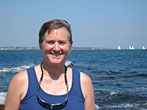 My name is Nancy Sills and I teach 6th grade Earth Science at Harris County Carver Middle School in Hamilton, Georgia. It is a rural community about an hour and a half south of Atlanta. My husband of 27 years and I are now going through "empty nest" and loving it! We enjoy the outdoors and spend a good deal of time on our farm. I love to read, cook and knit. We have three daughters. Jenny, is a new middle school teacher-she and her husband Jason are expecting their first child in September. Laura Ann is a journalism major at the University of Georgia. Amanda is a chemical and bimolecular engineering major at Georgia Institute of Technology. My name is Nancy Sills and I teach 6th grade Earth Science at Harris County Carver Middle School in Hamilton, Georgia. It is a rural community about an hour and a half south of Atlanta. My husband of 27 years and I are now going through "empty nest" and loving it! We enjoy the outdoors and spend a good deal of time on our farm. I love to read, cook and knit. We have three daughters. Jenny, is a new middle school teacher-she and her husband Jason are expecting their first child in September. Laura Ann is a journalism major at the University of Georgia. Amanda is a chemical and bimolecular engineering major at Georgia Institute of Technology.
Having been an educator since 1977, I have watched too many teachers head towards retirement and do less and less. I don't want to be one of those teachers. If I am not enthusiastic about my subject and teaching, how can I expect my students to be? Having taken numerous workshops and presented at conferences over the years, it seemed the right time to progress to the next level. For me that was to shadow a scientist and the ARMADA Project was just the ticket. I look forward to coming back to my classroom renewed and fortified by this experience prepared to share my newfound knowledge and experience with other teachers and students.
|
|




 Greetings, I'm Roy Arezzo, a native of Brooklyn, and I have been teaching science in New York City since 1989. I have served as a science department leader and curriculum developer in a variety of secondary education settings. I have a B.S. in biology from Marist College, on the Hudson River, and a Master's in Environmental Science Education. I have developed and taught courses in biology, environmental science, research and marine science.
Greetings, I'm Roy Arezzo, a native of Brooklyn, and I have been teaching science in New York City since 1989. I have served as a science department leader and curriculum developer in a variety of secondary education settings. I have a B.S. in biology from Marist College, on the Hudson River, and a Master's in Environmental Science Education. I have developed and taught courses in biology, environmental science, research and marine science. My name is Tom Bogard. I have had the pleasure of teaching middle school science for the past 15 years at Olentangy Local Schools in central Ohio. Education is a second career for me - it is a career that I have found a true passion for. Prior to becoming a teacher, I was coordinator of a small prairie nature center at The Ohio State University and I spent eight years in the Ohio Air National Guard.
My name is Tom Bogard. I have had the pleasure of teaching middle school science for the past 15 years at Olentangy Local Schools in central Ohio. Education is a second career for me - it is a career that I have found a true passion for. Prior to becoming a teacher, I was coordinator of a small prairie nature center at The Ohio State University and I spent eight years in the Ohio Air National Guard. My name is Maria D. Gomez and I teach 4th Grade at the Dr. T. Alexander Science Center School in Los Angeles. I have been teaching for 30 years, the majority of that time in California and in Michigan. Our school is an affiliated charter school, which means we are sponsored by the California Science Museum and the Los Angeles Unified School District. As such, our focus is on science, math, and technology in the classroom. Students who attend our school all aspire to become scientists when they grow up. My students are so excited about me being a "real scientist" and working with other scientists as part of the ARMADA Project. I am eager to begin my role as a "scientist" at the field site and then return to my students in the fall to share all of my experiences.
My name is Maria D. Gomez and I teach 4th Grade at the Dr. T. Alexander Science Center School in Los Angeles. I have been teaching for 30 years, the majority of that time in California and in Michigan. Our school is an affiliated charter school, which means we are sponsored by the California Science Museum and the Los Angeles Unified School District. As such, our focus is on science, math, and technology in the classroom. Students who attend our school all aspire to become scientists when they grow up. My students are so excited about me being a "real scientist" and working with other scientists as part of the ARMADA Project. I am eager to begin my role as a "scientist" at the field site and then return to my students in the fall to share all of my experiences. My name is Stephen Howard and I currently teach 7th and 8th grade general science at Meadowdale Middle School in Lynnwood, Washington (about 15 miles north of Seattle). Though I cover many areas of earth, space, physical and life science in my teaching, areas of particular interest to me are environmental sustainability, climate change, and marine biology. One highlight of each year is to take a group of my students on a 4-day sailing excursion around the Puget Sound studying plankton and factors that influence their abundance. This is my 14th year as a teacher. Though I was raised in the San Diego area, teaching brought me up to the Pacific Northwest where I've lived ever since (with the exception of an exciting year overseas teaching in Guam-I got to experience a Level 5 Typhoon that year!). I've never lived more than an hour's drive from the ocean and feel more at home on the beach than anywhere else. When I'm not teaching, I like to spend my time cooking, reading, sea kayaking, hiking and generally horsing-around with my 6-year old daughter.
My name is Stephen Howard and I currently teach 7th and 8th grade general science at Meadowdale Middle School in Lynnwood, Washington (about 15 miles north of Seattle). Though I cover many areas of earth, space, physical and life science in my teaching, areas of particular interest to me are environmental sustainability, climate change, and marine biology. One highlight of each year is to take a group of my students on a 4-day sailing excursion around the Puget Sound studying plankton and factors that influence their abundance. This is my 14th year as a teacher. Though I was raised in the San Diego area, teaching brought me up to the Pacific Northwest where I've lived ever since (with the exception of an exciting year overseas teaching in Guam-I got to experience a Level 5 Typhoon that year!). I've never lived more than an hour's drive from the ocean and feel more at home on the beach than anywhere else. When I'm not teaching, I like to spend my time cooking, reading, sea kayaking, hiking and generally horsing-around with my 6-year old daughter. I'm John Karavias from Holbrook, New York and I teach college-level marine biology at Walt Whitman High School in Huntington Station, New York. My journey from biology teacher to ARMADA master teacher started 5 years ago when I was awarded an $8,000 grant by the South Huntington Education Foundation (SHEF) to build a saltwater laboratory in my classroom. From being a "dry" school a few years ago, to currently offering marine biology to over 100 students yearly is something of which Whitman is very proud. As a result of the SHEF grant and the support of my district, we have made tremendous strides! Furthermore, several of my students each year have moved on to study marine science in post-secondary academia.
I'm John Karavias from Holbrook, New York and I teach college-level marine biology at Walt Whitman High School in Huntington Station, New York. My journey from biology teacher to ARMADA master teacher started 5 years ago when I was awarded an $8,000 grant by the South Huntington Education Foundation (SHEF) to build a saltwater laboratory in my classroom. From being a "dry" school a few years ago, to currently offering marine biology to over 100 students yearly is something of which Whitman is very proud. As a result of the SHEF grant and the support of my district, we have made tremendous strides! Furthermore, several of my students each year have moved on to study marine science in post-secondary academia. My name is Jeff Lawrence and I teach at Lowrey School, in Northeast Oklahoma near Tahlequah, which happens to be the tribal headquarters for the Cherokee Nation. I teach 5th through 8th grade science and have taught for 21 years at Lowrey. I also teach a college course on science at the local university. I enjoy traveling and about any sport or physical activity. I like to run and I coach team sports at my school. I have attended NOAA's Teacher at Sea Program and the Maury Project at the Annapolis Naval Academy last summer. I have always had a great interest in ocean studies, but have had little opportunity here in landlocked Oklahoma. I grew up watching Jacques Cousteau and dreaming of being an oceanographer. I love to teach science-it is always changing and presenting new ideas, topics, and discoveries to introduce to young curious minds.
My name is Jeff Lawrence and I teach at Lowrey School, in Northeast Oklahoma near Tahlequah, which happens to be the tribal headquarters for the Cherokee Nation. I teach 5th through 8th grade science and have taught for 21 years at Lowrey. I also teach a college course on science at the local university. I enjoy traveling and about any sport or physical activity. I like to run and I coach team sports at my school. I have attended NOAA's Teacher at Sea Program and the Maury Project at the Annapolis Naval Academy last summer. I have always had a great interest in ocean studies, but have had little opportunity here in landlocked Oklahoma. I grew up watching Jacques Cousteau and dreaming of being an oceanographer. I love to teach science-it is always changing and presenting new ideas, topics, and discoveries to introduce to young curious minds. Hello my name is Cheryl Manning and I'm a teacher at Evergreen High School in Evergreen, Colorado. I teach 9th grade honors earth science and environmental science to 11th and 12th graders. I have lived my entire life landlocked. As a young person growing up on a ranch in Montana, I visited the Pacific once. As a college student in the Intermountain West, I had the opportunity to go to both the Pacific and Atlantic a few times. For my honeymoon, my husband and I visited the Caribbean. As a geologist and teacher there is nothing more important to me than to learn about the parts of our planet that that I'm not familiar with. In my visits to the ocean I have learned that I love the sea and I would love to share a new understanding of the ocean and ocean processes with my students. I look forward to this adventure and hope to develop a new appreciation for scientific research and the process of learning, and let these enliven and enrich my teaching.
Hello my name is Cheryl Manning and I'm a teacher at Evergreen High School in Evergreen, Colorado. I teach 9th grade honors earth science and environmental science to 11th and 12th graders. I have lived my entire life landlocked. As a young person growing up on a ranch in Montana, I visited the Pacific once. As a college student in the Intermountain West, I had the opportunity to go to both the Pacific and Atlantic a few times. For my honeymoon, my husband and I visited the Caribbean. As a geologist and teacher there is nothing more important to me than to learn about the parts of our planet that that I'm not familiar with. In my visits to the ocean I have learned that I love the sea and I would love to share a new understanding of the ocean and ocean processes with my students. I look forward to this adventure and hope to develop a new appreciation for scientific research and the process of learning, and let these enliven and enrich my teaching. I'm Zamaria Rocio and for the past few years, I have had the privilege of teaching science to a diverse group of energetic middle school children from the inner city of San Diego. There are over 20 different primary languages spoken at our school. I feel very fortunate teaching these multicultural students because I am also learning so much from them.
I'm Zamaria Rocio and for the past few years, I have had the privilege of teaching science to a diverse group of energetic middle school children from the inner city of San Diego. There are over 20 different primary languages spoken at our school. I feel very fortunate teaching these multicultural students because I am also learning so much from them. Hi! I'm Karen Rudio. I have been teaching 7th and 8th grade science at Calcutt Middle School in Central Falls, Rhode Island for the past seven years. I enjoy working with the urban youth and sharing my enthusiasm for science with them. The ARMADA Project will spark their imaginations and make science real for them. I am very excited about this opportunity to join a research expedition. Prior to teaching, I was a research assistant doing tissue culture. I have a Master's in Biological Oceanography from the University of Rhode Island. I have also worked as a Peace Corps volunteer assisting fishpond owners in the Philippines. Besides teaching, I enjoy being a karate Mom, doing volunteer work, traveling and being outdoors---hiking, camping and bird watching.
Hi! I'm Karen Rudio. I have been teaching 7th and 8th grade science at Calcutt Middle School in Central Falls, Rhode Island for the past seven years. I enjoy working with the urban youth and sharing my enthusiasm for science with them. The ARMADA Project will spark their imaginations and make science real for them. I am very excited about this opportunity to join a research expedition. Prior to teaching, I was a research assistant doing tissue culture. I have a Master's in Biological Oceanography from the University of Rhode Island. I have also worked as a Peace Corps volunteer assisting fishpond owners in the Philippines. Besides teaching, I enjoy being a karate Mom, doing volunteer work, traveling and being outdoors---hiking, camping and bird watching. My name is Nancy Sills and I teach 6th grade Earth Science at Harris County Carver Middle School in Hamilton, Georgia. It is a rural community about an hour and a half south of Atlanta. My husband of 27 years and I are now going through "empty nest" and loving it! We enjoy the outdoors and spend a good deal of time on our farm. I love to read, cook and knit. We have three daughters. Jenny, is a new middle school teacher-she and her husband Jason are expecting their first child in September. Laura Ann is a journalism major at the University of Georgia. Amanda is a chemical and bimolecular engineering major at Georgia Institute of Technology.
My name is Nancy Sills and I teach 6th grade Earth Science at Harris County Carver Middle School in Hamilton, Georgia. It is a rural community about an hour and a half south of Atlanta. My husband of 27 years and I are now going through "empty nest" and loving it! We enjoy the outdoors and spend a good deal of time on our farm. I love to read, cook and knit. We have three daughters. Jenny, is a new middle school teacher-she and her husband Jason are expecting their first child in September. Laura Ann is a journalism major at the University of Georgia. Amanda is a chemical and bimolecular engineering major at Georgia Institute of Technology.